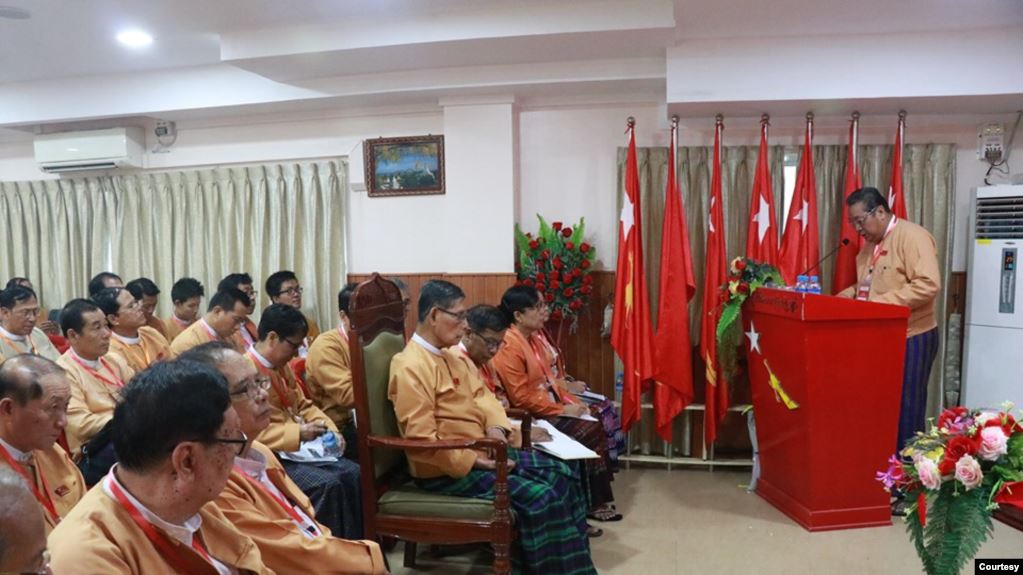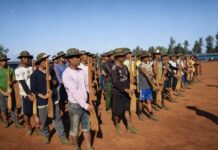On September 22, the National League for Democracy (NLD) announced at a press conference following its Ethnic Affairs Committee meeting, in Yangon, the formation of Ethnic Affairs Committee to be chaired by MP Inhtwanga Naw Seng from Kachin State.
Accordingly, the committee members would include Karen State Chief Minister Daw Nan Khin Htwe Myint and Rakhine or Arakan State Chief Minister Nyi Pu., which would be expanded later to include ethnic members from other states and divisions.

As earlier speculated by Ethnic Political Parties (EPPs) that the NLD is embarking on going it all alone. NLD Vice President Zaw Myint Maung admitted that establishing the Ethnic Affairs Committee was part of a strategy for the upcoming 2020 general election, he said at the press conference: “We need to overcome the power of the ethnic parties, which are merging within [their respective] ethnic regions to compete in the upcoming election. We established this committee to recruit more ethnic people into our party and work on ethnic affairs.”
On September 21, at the Central Executive Committee meeting, its member Tin Htut Oo told the NLD members that the party aimed at absolute victory to form government and is not interested in coalition-building.
In the same vein, the NLD spokesman Monywa Aung Shin said: “NLD will not indulge in either coalition forming in ethnic areas or (agreed) on competition in separate electoral areas.”
But coalition-building to form government within the parliament may be open, he told the BBC.
EPPs’ opinion
The EPPs are not at all enthusiastic with the NLD’s Ethnic Affairs Committee and even more so when its leadership has openly stated their objective to only capture more votes in ethnic states, without giving any interest or hint to cooperate in coalition-building with them, which literally means just an all-out competition.
A far cry from the collaboration between the NLD and EPPs during the oppressive military regime era that lasted until 2012, when the NLD reentered the by-elections brokered by the then Union Solidarity Development Party (USDP)-led Thein Sein government and won some 40 MP seats.
The NLD, together with the Shan Nationalities League for Democracy (SNLD) and other EPPs were alliance under the Committee Representing People’s Parliament (CRPP) umbrella to demand for the recognition of the electoral victory, where the NLD, SNLD and other EPPs won a landslide victory in 1990 first national election, since the military coup in 1962.
The NLD landslide victory in 2015 national election further alienated the EPPs, as the NLD reconciliation was carried out with the military only and conveniently left out the EPPs until today.
The alienation of the EPPs by the NLD was extra-ordinary, especially after the NLD-led government came to power in early 2016. For instance, the NLD refused to let the Arakan National Party (ANP) form Arakan State government, even though it received the most vote in Arakan State. But instead put up its own government led by NLD MP Nyi Pu.
Likewise, in Shan State, it sidelined the SNLD, which came out second after the USDP, with NLD coming out third, in Shan State government formation. It even humiliated the Shan electorate by appointing Linn Htut, a NLD MP who is Bamar as chief minister, which has never happened throughout Shan history even during successive military government eras. Shan State head of states were always from ethnic Shan background, even they may be the under the tutelage of the military dictatorship.
Zaw Myint Maung said: “We will form the Ethnic Affairs Committee with genuine Taingyinthar (indigenous ethnic people). (You) might be aware from 2015 that there is no government as colorful as the NLD.”
Pyithu Hluttaw or House of Representatives chairman is Kachin, vice chairman is Arakan, Amyotha Hluttaw or House of Nationalities chairman is Karen, vice president is Chin christian, and if you look at regions and states chief ministers, we have prioritized the local ethnics. We really take it seriously concerning the ethnics,” he added to make his point.
Perhaps, to mock the NLD Vice Chairman Zaw Myint Maung, on September 23, SNLD Vice Chairman Sai Nyint Lwin wrote in his Facebook: “As the committee will be formed by genuine indigenous ethnics , (we don’t know) whether we might have had fake ones (before).”
Regarding Zaw Myint Maung’s serious consideration statement on non-Bamar ethnic nationalities, Ye Htut the ex-information minister said the NLD would need to work hard in order to restore depleted trust of those which included: “Anti-(Gen Aung San)-statue erection protesters who were arrested; those who argued the naming of the bridge (as Gen Aung San bridge); those who won in state election but were not allowed to form government (ANP in Arakan State); those who were sidelined in the Nationwide Ceasefire Agreement (NCA) participation even though all should be accepted accordingly, but changed by the NLD that only parties that won election will be allowed to participate; and those who thought the government is doing things only according to foreign advisors,” according to the recent Eleven Media Group report.
All the EPPs, especially the ANP and SNLD are disappointed and what Pe Than, a Lower House lawmaker for the ANP representing Arakan State’s Myabon Constituency, told The Irrawaddy is also valid for all ethnic stakeholders.
He said: “We see no trace of respect for the ethnic parties [on the part of the NLD], or any sign of interest in cooperating [with us] in the upcoming election to help them win and follow the right path of democracy and forming a federalist state.”
EPP leaders see it quite clearly that the forming of the committee is just to woo the ethnic electorate and win more votes in ethnic states.
Ethnic mobilization
Even before the formation of the Ethnic Affairs Committee, the EPPs were aware that the NLD reconciliation priority is not with them and thus have been preparing to consolidate their parties and strengthen themselves by merging into one party in each state.
So far, Kachin, Karen, Kayah (Karenni) and Chin States are able to achieve fusion and formed new parties, such as The Kachin State People Party, Mon Unity Party, Karen National Democratic Party, Kayah State Democratic Party and Chin National League for Democracy, which all plan to enter and compete in the upcoming general election in 2020.
In 2015 election NLD won in all ethnic states except in Shan and Arakan States. But this time in 2020 the result could be quite different, given the disappointment of the ethnic electorate because the NLD abandoned them and wasn’t able to deliver on its election campaign promises, particularly to end the civil war and the inability to amend the constitution to limit the political clout of the military.
Perspectives
Give such scenarios and track record, the recent Ethnic Affairs Committee formation, promoting NLD as a national party, and its cosmetic reconciliation gesture are all seen a drawback than an achievement by the EPPs and the majority ethnic electorate.
Regarding the Ethnic Affairs Committee, the NLD top leaders have themselves made it clear that it is an instrument to achieve absolute victory in the ethnic states, including the whole country. This means there is no venue open for a coalition talks and cooperation with the EPPs, which in turn means everyone for himself in the merciless election arena.
The NLD trying to project itself as a national party, cross-cutting across ethnic lines, is not accepted by the EPPs and the ethnic states population in general.
The boasting of Zaw Myint Maung that the NLD is a colorful party which includes many ethnic individuals is not convincing, as it is not done on a party-to-party coalition agreement on policy adjustment but on handpick, individual liking for the minister portfolios and could be fired anytime by the NLD government.
In sum, rejection of coalition-building by the NLD, including inflicting grievances to the vast variety strata of people as ex-information minister earlier lined them up, will likely cost its absolute majority vote, which has to achieve 333 from a total of 664 in the parliament. While in 2015 election, the NLD won 390 and could form the government, this time around with a lot of preparation and energized competition by the EPPs in ethnic states and as well the financially well-heeled military-backed political parties and other new populist parties in the Bamar-dominated regions, pundits are speculating that NLD could lose a hundred or more seats, in 2020 election.
If this happens, whether the NLD likes it or not it will have to look for coalition partners. The same situation will also befall on military bloc of USDP and the military MPs, who are allotted with 25% in the parliament, according to the military-drafted 2008 constitution.
We can only wait and see whether the NLD go it alone is a winning strategy or not in the upcoming 2020 national election.











Leave a Comments